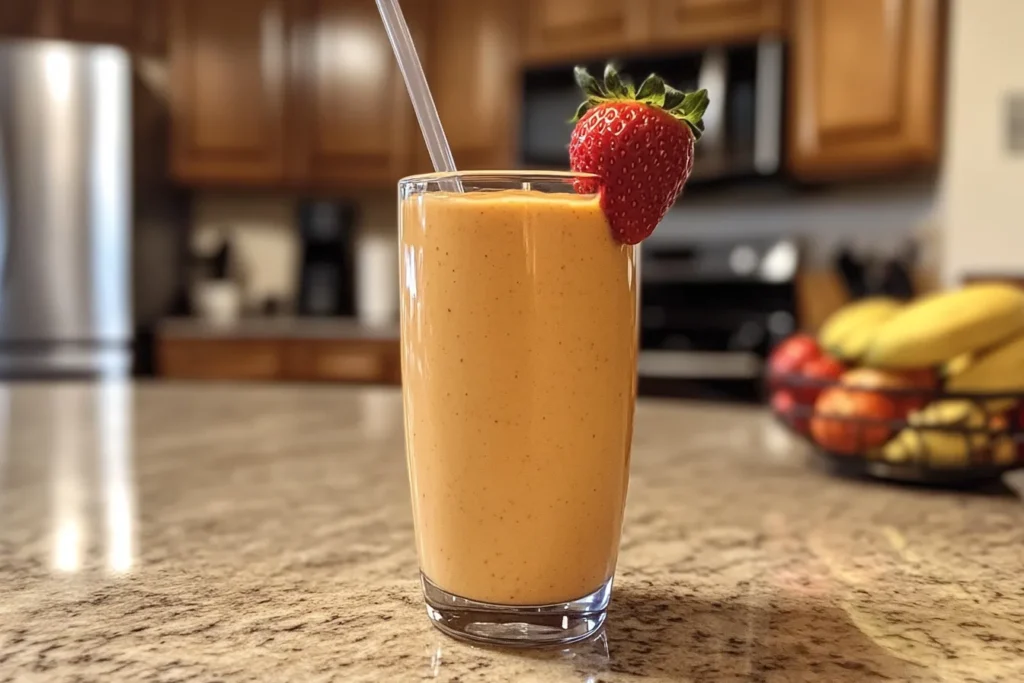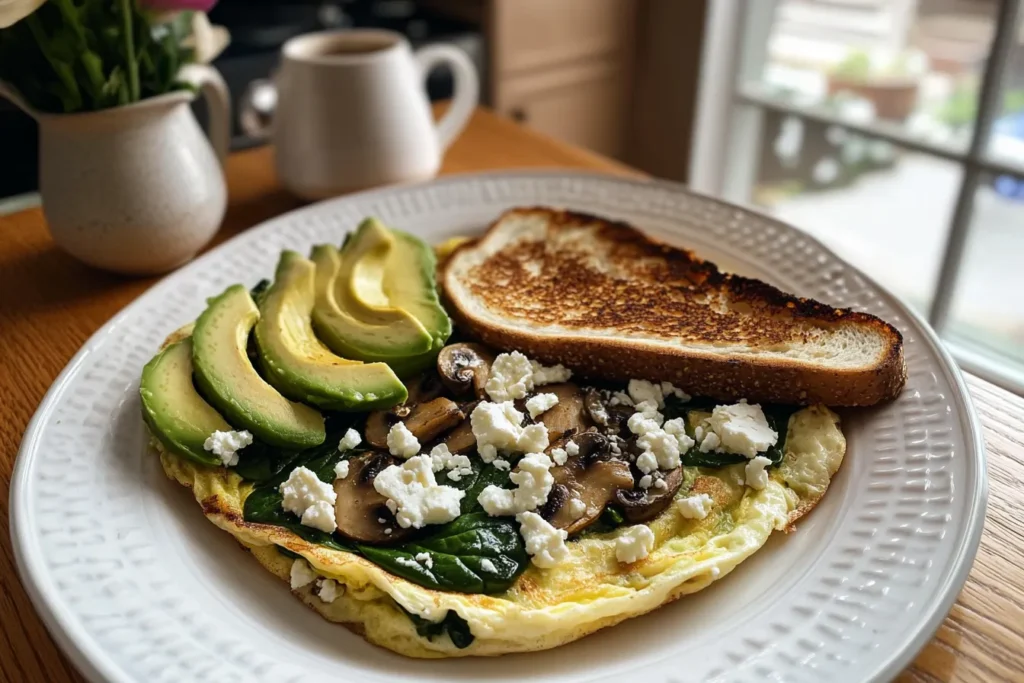Table of Contents
A high-protein breakfast is more than just a morning meal—it’s a powerful start to your day. Packed with energy-boosting nutrients, protein helps you stay full longer, supports muscle repair, and fuels your metabolism. Whether you’re a fitness enthusiast or just someone trying to make healthier choices, a protein-rich breakfast can make a significant difference in how you feel throughout the day.
Starting your day with a high-protein meal can keep hunger at bay and prevent the mid-morning energy slump. From eggs and Greek yogurt to smoothies and protein-packed pancakes, there are endless ways to enjoy a nutritious breakfast while meeting your protein needs.
Why Protein Matters
Protein’s Role in Energy and Muscle Maintenance
Protein is a building block of life, playing a vital role in repairing tissues, maintaining muscle mass, and keeping your body energized. After a night’s rest, your body craves nutrients to kickstart its metabolism. A high-protein breakfast not only fuels your energy levels but also ensures you’re providing your muscles with the amino acids they need to recover and grow.
Did you know?
“Protein is the most satiating macronutrient, meaning it keeps you feeling fuller for longer compared to fats or carbohydrates.”
Comparison: High Protein vs. Carbohydrate-Heavy Breakfasts
Carbohydrate-heavy breakfasts, like sugary cereals or pastries, often lead to a quick energy spike followed by a crash. In contrast, a high-protein breakfast provides a sustained energy release. For example, swapping a bowl of cereal for a Greek yogurt bowl with nuts and berries can stabilize your blood sugar and help you feel more satisfied until lunch.
Daily Protein Needs
How much protein do you need? While the daily recommended intake varies based on factors like age, activity level, and health goals, aiming for 15-25 grams of protein at breakfast is a great start. Foods like eggs, cottage cheese, and lean meats make it easier to hit this target.
Quick High Protein Breakfast Options
High-Protein Smoothie Recipes
Smoothies are a fast and versatile way to pack protein into your morning. Start with a high-protein base like Greek yogurt, milk, or a plant-based milk alternative, then add fruits, spinach, and a scoop of protein powder. Here’s a quick recipe:
Peanut Butter Berry Smoothie
- Ingredients:
- 1 cup unsweetened almond milk
- 1 scoop whey or plant-based protein powder
- 1 tbsp peanut butter
- 1/2 cup frozen mixed berries
- 1/2 banana
- Instructions: Blend all ingredients until smooth, pour into a glass, and enjoy.
Protein per serving: ~25g

Greek Yogurt Bowls
Greek yogurt is naturally rich in protein and makes an excellent base for a customizable breakfast bowl. Combine 1 cup of plain Greek yogurt with toppings like granola, nuts, chia seeds, and fresh fruit. Drizzle with honey for a touch of sweetness.
Overnight Oats with Protein
Overnight oats are convenient and can be enriched with protein by stirring in Greek yogurt, nut butter, or protein powder. Try this recipe:
- Chocolate Almond Overnight Oats
- 1/2 cup rolled oats
- 1/2 cup milk (or a milk alternative)
- 1 tbsp almond butter
- 1 scoop chocolate protein powder
- Mix ingredients, refrigerate overnight, and top with almond slices before eating.
Protein per serving: ~20g
Grab-and-Go High Protein Breakfast Snacks
For those rushed mornings, protein bars, boiled eggs, or nut butter on whole-grain toast can save the day. Look for bars with at least 10 grams of protein and minimal added sugar for the best nutritional value.
Egg-Based High Protein Breakfast Ideas
Eggs are a breakfast staple, thanks to their high protein content and versatility. Try these ideas:
- Classic Scrambled Eggs: Pair with whole-grain toast and avocado.
- Veggie-Packed Omelet: Add spinach, mushrooms, and feta cheese.
- Hard-Boiled Eggs: Prep in advance for an easy grab-and-go option.

Detailed Recipes for High Protein Breakfasts
Classic Protein Omelet
| Ingredients | Quantity |
|---|---|
| Large eggs | 3 (or 2 eggs + 2 whites) |
| Chopped spinach | 1/4 cup |
| Diced bell peppers | 1/4 cup |
| Shredded cheddar cheese | 2 tbsp |
| Cooked chicken or turkey | 2 oz (optional) |
| Salt and pepper | To taste |
Instructions:
- Whisk the eggs with salt and pepper.
- Heat a skillet over medium heat, pour in eggs, and let edges set.
- Add spinach, peppers, cheese, and chicken on one side.
- Fold the omelet and cook until cheese melts.
Protein per serving: ~25g
Peanut Butter Banana Smoothie
| Ingredients | Quantity |
|---|---|
| Milk (or plant-based milk) | 1 cup |
| Banana | 1 medium |
| Peanut butter | 1 tbsp |
| Vanilla protein powder | 1 scoop |
| Ice cubes | A few |
Instructions:
Blend all the ingredients until smooth. Serve immediately.
Protein per serving: ~30g
Cottage Cheese and Fruit Bowl: A Quick High Protein Breakfast
| Ingredients | Quantity |
|---|---|
| Low-fat cottage cheese | 1 cup |
| Pineapple chunks | 1/2 cup |
| Sliced strawberries | 1/4 cup |
| Flaxseeds or chia seeds | 1 tbsp |
Instructions:
Combine all ingredients in a bowl, mix well, and enjoy.
Protein per serving: ~20g
Protein Pancakes
| Ingredients | Quantity |
|---|---|
| Rolled oats | 1/2 cup |
| Vanilla protein powder | 1 scoop |
| Egg whites | 1/2 cup |
| Unsweetened almond milk | 1/4 cup |
| Baking powder | 1/2 tsp |
| Vanilla extract | 1 tsp |
Instructions:
- Blend all ingredients to form a smooth batter.
- Heat a skillet, pour batter to form pancakes.
- Cook 2-3 minutes per side until golden.
Protein per serving: ~20g
Tips for Boosting Protein Intake at Breakfast
Choosing the Right Protein Sources
Selecting high-quality protein sources can significantly impact the nutritional value of your breakfast. Opt for lean proteins like eggs, Greek yogurt, cottage cheese, and plant-based options such as tofu or tempeh. These foods are rich in essential amino acids and low in unhealthy fats.
Did you know?
“Combining plant proteins, like beans and whole grains, creates a complete protein profile similar to animal proteins.”
Simple Swaps to Increase Protein Content
Small adjustments can make a big difference. Here are a few easy swaps:
- Replace regular milk with high-protein milk or unsweetened almond milk with added protein.
- Use quinoa or farro instead of oatmeal as a breakfast base.
- Spread almond butter or peanut butter on whole-grain toast instead of jelly or butter.
- Add a scoop of protein powder to pancake batter, smoothies, or even coffee for an instant boost.
Incorporating Protein into Classic Breakfasts
Even traditional breakfast items can get a protein upgrade:
- Sprinkle chia or hemp seeds on top of cereals, parfaits, or toast.
- Mix cottage cheese with scrambled eggs for a fluffy, protein-rich dish.
- Stir protein powder into your overnight oats or yogurt.
Balance is Key
While protein is essential, don’t neglect other nutrients like fiber, vitamins, and healthy fats. Pair protein sources with whole grains, fruits, and vegetables for a balanced and satisfying meal.
Common Myths About Protein
Myth 1: High-Protein Diets Lead to Weight Gain
One common misconception is that eating a lot of protein will inevitably cause weight gain. However, protein is less likely to be stored as fat compared to carbohydrates or fats. It boosts metabolism, helps preserve lean muscle mass, and reduces overall calorie intake by increasing satiety.
Myth 2: You Need Supplements to Meet Your Protein Goals
While protein powders and bars are convenient, they’re not necessary for meeting daily protein needs. Whole foods like eggs, dairy, legumes, and lean meats are excellent sources of protein. Supplements can complement your diet, but they’re not a requirement.
Myth 3: Too Much Protein is Harmful to Your Kidneys
For individuals with healthy kidneys, consuming a high-protein diet does not pose a risk. This myth stems from studies on people with pre-existing kidney issues. If you’re healthy, a balanced diet with adequate protein is safe and beneficial.
Myth 4: Plant-Based Proteins Aren’t as Effective as Animal Proteins
While plant-based proteins might lack one or two essential amino acids, combining different plant sources (like rice and beans) creates a complete protein profile. Plant-based diets can be as effective as omnivorous diets when planned thoughtfully.
Myth 5: Protein is Only for Bodybuilders
Protein isn’t just for muscle building. It supports cellular repair, hormone production, and immune function—important for everyone, regardless of fitness goals. Even if you’re not hitting the gym daily, your body benefits from an adequate protein intake.
FAQs About High Protein Breakfasts
1. How Much Protein Should a High Protein Breakfast Contain?
A balanced breakfast should include 15-25 grams of protein. This amount helps stabilize blood sugar levels, keeps you feeling full longer, and supports muscle repair and growth. Adjust the amount based on your activity level and dietary needs.
2. Are Protein Powders Necessary for Breakfast?
Protein powders are not essential but can be a convenient way to increase your protein intake, especially if you’re short on time. They’re ideal for smoothies or mixing into oatmeal. However, whole food sources like eggs, yogurt, and legumes are equally effective.
3. What Are the Best Plant-Based Protein Sources for Breakfast?
Great plant-based options include:
- Tofu scramble
- Chia seed pudding
- Overnight oats with almond butter
- Plant-based protein powders
- Whole-grain toast with hummus
These options provide a good balance of protein and other essential nutrients.
4. Can Kids Eat a High Protein Breakfast?
Yes, children can benefit from a protein-rich breakfast. It helps with their energy levels and supports growth and development. Suitable options include scrambled eggs, peanut butter on toast, or Greek yogurt with fruit.
5. What Are the Signs You’re Not Eating Enough Protein for Breakfast?
Symptoms of insufficient protein include fatigue, frequent infections, muscle weakness, and brittle hair or nails. Ensuring you get enough protein at breakfast is a step toward meeting your daily nutritional needs.
6. Is It Possible to Overdo Protein in a High Protein Breakfast?
While it’s hard to overconsume protein from whole foods, consistently eating extremely high amounts might displace other nutrients in your diet. Stick to balanced meals to ensure a variety of vitamins and minerals.
Conclusion
A high-protein breakfast is a game-changer for energy, satiety, and overall health. Starting your day with protein-rich foods like eggs, Greek yogurt, or smoothies not only keeps hunger at bay but also fuels your body for success. Whether you’re grabbing a quick bite or sitting down for a hearty meal, there are endless ways to incorporate protein into your morning routine.
By understanding the benefits, experimenting with recipes, and making simple swaps, you can transform your breakfast into a powerhouse meal. Don’t let myths hold you back—protein is essential for everyone, not just bodybuilders. So, why not start your day with a plate of protein-packed goodness?

